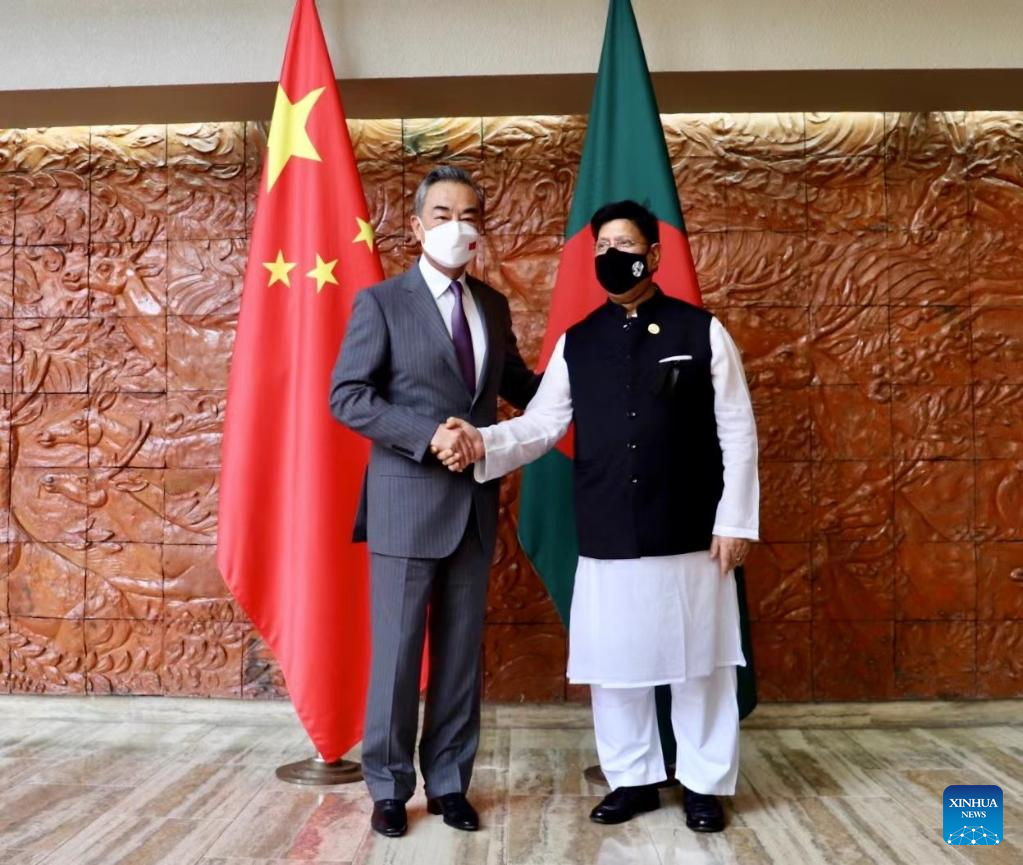China, Bangladesh vow closer cooperation, oppose separatism

Chinese State Councilor and Foreign Minister Wang Yi holds talks with Bangladeshi Foreign Minister A. K. Abdul Momen in Dhaka, Bangladesh, Aug. 7, 2022. (Xinhua/Liu Chuntao)
DHAKA, Aug. 7 (Xinhua) -- Bangladeshi Foreign Minister A. K. Abdul Momen and visiting Chinese State Councilor and Foreign Minister Wang Yi held talks here on Sunday, with both sides pledging to deepen the synergy between their development strategies and oppose separatism.
Momen said Bangladesh and China are partners with mutual trust and for common development, and that deepening unity and cooperation between the two sides is an irreplaceable choice for Bangladesh.
Since the establishment of diplomatic ties, the Bangladesh-China relationship has developed rapidly, said Momen. He thanked China for its valuable support for Bangladesh's fight against the COVID-19 pandemic, and helping Bangladesh to speed up its infrastructure construction.
He said China has become Bangladesh's biggest trading partner, and Bangladesh looks forward to strengthening the docking of its "Sonar (golden) Bangla" dream and the joint construction of the Belt and Road in efforts to realize its vision and goal at an early date.
Wang congratulated Bangladesh on its thriving economy and sustained improvement to people's livelihood, saying the smooth advancing of China-Bangladesh cooperation in various fields has brought benefits to both peoples.
In the process of its realizing the "Sonar (golden) Bangla" dream, China has always been the most reliable long-term strategic partner of Bangladesh, and is willing to promote the in-depth docking of the Belt and Road Initiative with Bangladesh's development strategy, accelerate the joint feasibility study of the China-Bangladesh free trade agreement, and share development and market opportunities as well as advanced experiences and technologies, Wang said.
Wang elaborated on China's position on the Taiwan question, expressed appreciation for Bangladesh's immediate support for China's legitimate claim, and stressed that China is willing to work with the vast majority of developing countries to jointly safeguard each other's sovereignty and territorial integrity, jointly uphold the basic norm governing international relations of non-interference in others' internal affairs, jointly maintain global and regional peace and stability, jointly oppose and contain all secessionist activities, and jointly strive for a favorable external environment for development.
Momen said Bangladesh firmly adheres to the one-China principle, believes that Taiwan is part of China's territory, and supports China in safeguarding its core interests and addressing major concerns.
Some countries do not want to see developing countries grow and try every means to create various obstacles, Momen said, stressing that the world needs the strength and voice of China, and Bangladesh will stand firmly with China.
The Bangladeshi foreign minister said his country advocates multilateralism, adheres to the five principles of peaceful coexistence and maintains that the purposes and principles of the United Nations Charter must be upheld, resolutions of the UN General Assembly be implemented, and separatism be effectively contained, otherwise, it will be a disaster for the whole world.
The two sides agreed to strengthen cooperation in the areas of infrastructure, economic and industrial parks, and cultural and people-to-people exchanges, to expand cooperation in local currency settlement, 5G and clean energy, and to maintain close communication and coordination in international and regional affairs.
Wang announced that China's zero-tariff treatment for 98 percent of taxable items exported to China from Bangladesh will officially take effect on Sept. 1, adding that China welcomes the export of Bangladeshi specialty products to it.
The two sides also had an in-depth exchange of views on issues of common concern.
After the talks, the two foreign ministers witnessed the signing of cooperation documents on infrastructure, disaster prevention and mitigation, culture and tourism, and maritime affairs.


